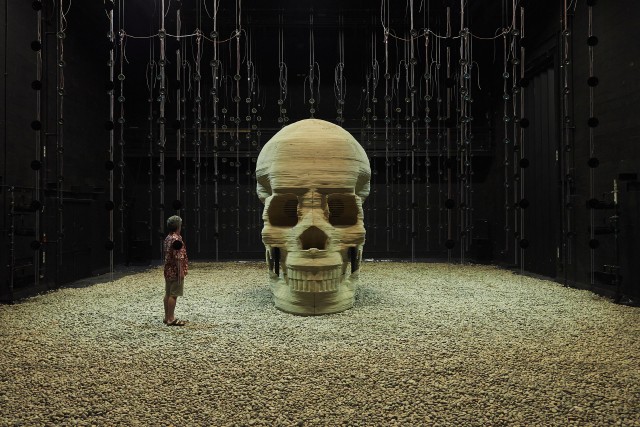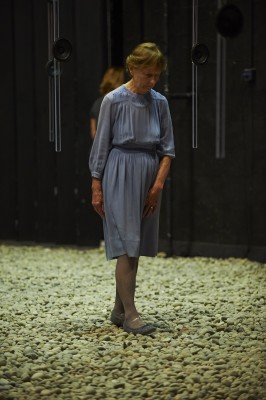
Andrew Bennett prepares to enter the mind of Henry in Samuel Beckett’s EMBERS (photo by Ros Kavanagh)
Brooklyn Academy of Music
BAM Harvey Theater
651 Fulton St. between Ashland & Rockwell Pl.
September 17-20, $35-$50
718-636-4100
www.bam.org
www.panpantheatre.com
Revivals of the absurdist works of Samuel Beckett can almost always be found somewhere in the city, but there’s been a surfeit of fine productions of late, including C.I.C.T. / Théâtre des Bouffes du Nord’s Fragments at BAC, Trevor Nunn’s All That Fall with Eileen Atkins and Michael Gambon at 59E59, Krapp’s Last Tape with John Hurt at BAM, and, most famously, this year’s Broadway version of Waiting for Godot with Sirs Patrick Stewart and Ian McKellen. Now Pan Pan Theatre, based in Beckett’s hometown of Dublin, has added quite a dash of panache to their production of his second radio play, Embers, a 1959 work that Beckett himself was disappointed with; “My fault, text too difficult,” he wrote to American director Alan Schneider in a letter after its first airing. As the fifty-five-minute U.S. premiere, running at the BAM Harvey through September 20 as part of the Next Wave Festival, begins, three men and one woman walk around a stage strewn with rocks, a large object in the center covered by a tarp, as dozens of cables holding eight evenly spaced small speakers apiece dangle from the ceiling, essentially announcing that this is very much about sound. Gentle, soothing surf can be heard as one of the men pulls the tarp off the object, revealing a stunning skull. Then Andrew Bennett and Áine Ní Mhuirí step behind the skull, the former, as Henry, occasionally visible through the right eyehole, the latter, as his wife, Ada, behind the left. They remain there as Henry, in a deep, booming voice made for radio, relates stories from his life, concentrating on the mysterious death of his father, his relationship with Ada, and his thoughts about their daughter, Addie. Various phrases repeat — “white world, great trouble, not a sound,” along with calls for hooves that are answered and screams of “Christ!” that are not — in Henry’s long monologues that open and close the show, framing a conversation between husband and wife that brings up old memories.

Áine Ní Mhuirí wanders the rocky shore of memory in Pan Pan Theatre production at BAM (photo by Ros Kavanagh)
“Laugh, Henry, it’s not every day I crack a joke,” Ada says. “Laugh, Henry, do that for me.” “You wish me to laugh?” he asks. “You laughed so charmingly once,” she responds. His attempt at laughter is both funny and sad as he chortles, “Any of the old charm there?” Among the stories that crop up in Henry’s mind as he contemplates his failure as a writer, father, husband, and son and his own impending death are Addie getting scolded by her piano teacher and the odd tale of Bolton and Holloway, two men who might or might not represent Henry and/or his father (as might Ada and Addie, two names that are not only oddly similar but are close to “Dad” and “Daddy”). Indeed, there is an ambiguity throughout Embers that both confuses and delights; those looking for specific meaning are unlikely to find it, much like Henry’s search through his mind-skull for the meaning of his own existence. Director Gavin Quinn keeps things visually interesting through Aedín Cosgrove’s lighting, which focuses on different parts of Andrew Clancy’s skull, and Jimmy Eadie’s sound design, which melds the lapping of the ocean with changes in Henry’s vocal pitch. Ultimately, all that is left are “embers, sound of dying, dying glow,” Henry poetically says, as death stares him in the face, as it does to each and every one of us. (For more Beckett in Brooklyn, BAM will be presenting the Royal Court Theatre’s trio of one-woman plays, Not I, Footfalls, Rockaby, October 7-12 starring Lisa Dwan and directed by longtime Beckett collaborator Walter Asmus.)